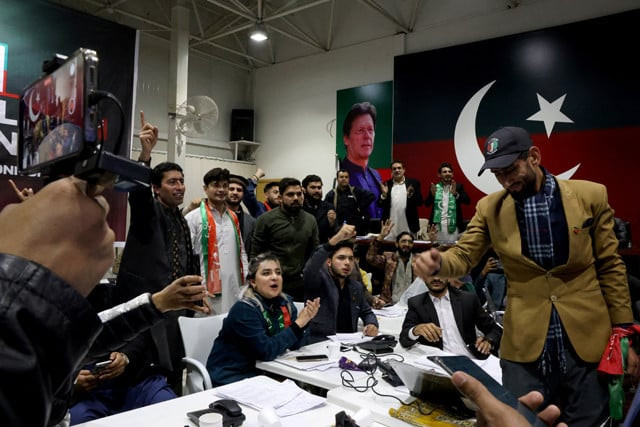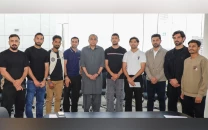PTI strategies govt formation at Centre, Punjab, K-P
Party leaders brief President Alvi on alleged irregularities during polls

The Pakistan Tehreek-e-Insaf (PTI) is formulating a plan to form government in Centre, Punjab and Khyber Pakhtunkhwa amidst the rise of its backed independent candidates as leading contenders in the general elections held on Feb 8.
A statement issued after the party’s core committee on Monday stated that specialised committees entrusted with the responsibility of devising strategies for government formation in these pivotal regions had been constituted.
These bodies are focused on accelerating the nomination process for crucial governmental and parliamentary roles, guided by their proposed recommendations and strategies.
The embattled party secured a heavy mandate in the last week’s polls, winning 92 of the 266 National Assembly and 90 of 112 K-P Assembly seats.
The PTI-backed candidates ran as independents due to the party losing the election symbol of ‘bat’ following controversy surrounding its intra-party elections.
In the statement, the party hailed the citizens for exhibiting political and democratic maturity through their enthusiastic engagement in the electoral process on Feb 8.
The PTI affirmed its commitment to prevent any unethical endeavours to hand over the country’s leadership to individuals with criminal backgrounds.
Read also: PTI asserts majority, urges respect for public mandate
The party maintained that the populace, through their votes, bestowed upon PTI’s founding chairman Imran Khan an “unparalleled certificate of patriotism”, giving a “heavy mandate” to his party.
Separately, PTI leaders held a meeting with President Dr Arif Alvi and briefed him on the alleged irregularities during the elections.
According to a statement issued by the president's office, Dr Alvi met with PTI leaders Raoof Hassan and Umer Niazi, during which they informed the president about the evident irregularities during the Feb 8 polls.
The PTI delegation apprised the president of the party's stance and reiterated that Form-45, issued in various constituencies, reflected the true facts of the electoral outcomes.
They emphasised that despite attempts to pressurize the party, snatching of electoral symbols, and numerous arrests, PTI emerged victorious against all odds.
The president is bound to summon a National Assembly session to elect the speaker, deputy speaker, and the leader of the house by February 29.
Read: PTI leaders share election ‘irregularities’ with president
According to the Constitution, the president must convene the National Assembly session three weeks after the election.
It could be called earlier if a political party secures two-thirds of the seats in the National Assembly or if political parties reach an agreement to form a coalition government.
A day earlier, the PTI had demanded immediate resignation of Chief Election Commissioner (CEC) Sikandar Sultan Raja, accusing him of dereliction of his constitutional and legal duties and playing the role of a facilitator in what it termed as 'poll fraud.'
The party further insisted that not only should CEC Raja step down, but the members of the Election Commission of Pakistan (ECP) should also tender their resignations.
It alleged that they colluded to strip PTI-backed candidates of the mandate bestowed upon them by the people in the elections.
According to the PTI, the party was cruising with a lead of 170 National Assembly seats before the alleged rigging swung the pendulum in favour of the PML-N.
Around 60 million, or approximately 47%, of nearly 129 million voters cast their ballots on Thursday.





1733130350-0/Untitled-design-(76)1733130350-0-208x130.webp)













COMMENTS
Comments are moderated and generally will be posted if they are on-topic and not abusive.
For more information, please see our Comments FAQ